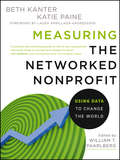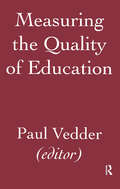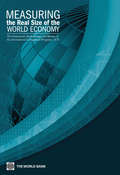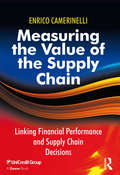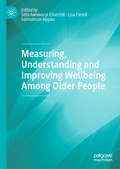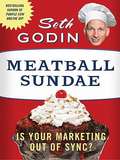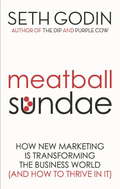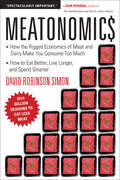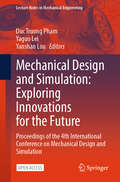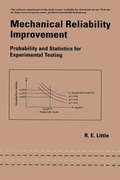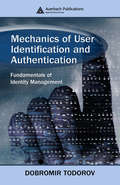- Table View
- List View
Measuring the Networked Nonprofit: Using Data to Change the World
by Beth Kanter Katie Delahaye PaineThe tools nonprofits need to measure the impact of their social media Having a social media measurement plan and approach can no longer be an after-thought. It is a requirement of success. As nonprofits refine their social media practice, their boards are expecting reports showing results. As funders provide dollars to support programs that include social media, they too want to see results. This book offers the tools and strategies needed for nonprofits that need reliable and measurable data from their social media efforts. Using these tools will not only improve a nonprofit?s decision making process but will produce results-driven metrics for staff and stakeholders. A hands-on resource for nonprofit professionals who must be able to accurately measure the results of their social media ventures Written by popular nonprofit blogger Beth Kanter and measurement expert Katie Delahaye Paine Filled with tools, strategies, and illustrative examples that are highly accessible for nonprofit professionals This important resource will give savvy nonprofit professionals the information needed to produce measurable results for their social media.
Measuring the Quality of Education
by Paul VedderThis book contains a selection of articles on measuring the quality of education from the perspective of the importance of theories on education, changing effects of education, curriculum dependent or curriculum independent measurement, product and process evaluation, and global curricula.
Measuring the Real Size of the World Economy: The Framework, Methodology, and Results of the International Comparison Program (ICP)
by the editors at The World BankMeasuring the Real Size of the World Economy: The Framework, Methodology, and Results of the International Comparison Program—ICP is the most comprehensive accounting ever presented by the International Comparison Program (ICP) of the theory and methods underlying the estimation of purchasing power parities (PPPs). PPPs reveal the relative sizes of economies by converting their gross domestic products and related measurements into a common currency, thereby enabling comparisons based on economic and statistical theory. By disclosing the theory, concepts, and methods underlying the estimates, this book increases the transparency of the ICP process. Greater transparency allows researchers, users of PPPs, and those involved in implementation of the program to better understand the strengths, limitations, and assumptions underlying its results. is book also provides a forward-looking view of methodological developments with an eye toward improving the quality of future comparisons. The ICP is now the largest and most complex statistical program in the world. In 2005 it included 100 countries and economies, working in parallel with the 46 countries in the Eurostat-Organisation for Economic Co-operation and Development (OECD) PPP program. Measuring the Real Size of the World Economy was prepared by the ICP Global Office in the World Bank, with contributions from the leading international experts in the fields of economics and statistics on international comparisons.
Measuring the Science and Engineering Enterprise: Priorities for the Division of Science Resources Studies
by National Research CouncilThe science and engineering enterprise has continued to evolve, responding over the last decade to increased economic globalization, a post-cold war military, federal budget fluctuations, and structural changes in the way science and engineering are conducted and innovations are adopted. This report suggests ways to revise the data collection activities of the Science Resources Studies Division (SRS) of the National Science Foundation to better capture the current realities of R&D funding and S&E human resources. The report’s recommendations would improve the relevance of the data on graduate education, the labor market for scientists and engineers, and the funding and conduct of research and development, and thus better meet the data needs of policymakers, managers, and researchers.
Measuring the Value of the Supply Chain: Linking Financial Performance and Supply Chain Decisions
by Enrico CamerinelliIn a company ecosystem the supply chain manager is tasked with duties and objectives primarily aimed at controlling and reducing costs, while optimizing the material flows. Yet, in many organizations, common perception limits supply chain management to product logistics, materials handling and warehouse management. The supply chain manager must learn how to communicate the results of his work to show the importance and impact supply chain management operations have on a company. In this book, Enrico Camerinelli provides the supply chain manager and the chief financial officer with the means to link the value of the supply chain to an organization's bottom line. He explores the problem with current supply chain metrics, shows how to close the gap between financial decisions and supply chain performance, suggests a model to provide a lingua franca for supply chain, financial and other managers throughout the company and points to ways in which new technology can help measure the value of the supply chain. Using case studies and interviews with supply chain and financial experts, Measuring the Value of the Supply Chain will help financial and supply chain managers achieve strategic advantage through effective supply chain management.
Measuring, Understanding and Improving Wellbeing Among Older People
by Sefa Awaworyi Churchill Lisa Farrell Samuelson AppauHow can we be happier, healthier and more satisfied in life? This edited collection examines various dimensions of wellbeing among older people, including its measurement; social, environmental and economic determinants; and how research can be translated into policy to improve quality of life for older people. With an increasingly ageing population across countries and an increasing population of older adults, there is growing interest in improving older people’s ability to live healthily and happily. With a focus on retirement and aged care, this book is important reading for those interested in Welfare Economics, Health Economics and Development.
Meat Market: Animals, Ethics, and Money
by Erik MarcusMeat Market elevates the debate over animal agriculture. Erik Marcus exposes and clears away the exaggerated claims and counterclaims put forth by the meat industry and its opponents. In the process, Marcus presents a thorough examination of animal agricultures cruelties and its far-reaching social costs. Marcus then considers the discouraging progress made by the animal protection movement. He evaluates where the movement has gone wrong, and how its shortcomings could best be remedied.
Meat, Commerce and the City: The London Food Market, 1800–1855 (Perspectives in Economic and Social History #18)
by Robyn S MetcalfeThis study examines the struggle between Smithfield market's supporters and detractors and argues that this demonstrates a major shift in the way the urban landscape came to be used.
Meatball Sundae
by Seth GodinAmerican Express could have become PayPal, but they watched the opportunity go by. Fedex uses technology to make shipping easier for the customer; UPS uses technology to make shipping easier for UPS. Who's winning? Google has broken the world into tiny bits. No one visits a Web site's home page anymore; they go in the back door, to just the place Google sent them. New Marketing, whose tools include things like MySpace, You Tube, Web sites, permission marketing, cable TV, and viral techniques, is reshaping our world. But many companies try to use the tools without first getting their organization and products in sync with them. The result: what Seth Godin calls a "meatball sundae. " A big, ineffective mess. In his trademark style -- clear, accessible, jargon-free, and full of real-life examples -- Godin reviews how marketing used to work and explains how to use the New Marketing to become a better organization: faster, more flexible, and even more fun. Seth Godin is a bestselling author, entrepreneur and agent of change. His book Permission Marketing was an Amazon. com Top 100 bestseller for a year, a Fortune Best Business Book, and spent four months on the Business Week bestseller list. It also appeared on the New York Times business book bestseller list. He lives in Westchester County, New York.
Meatball Sundae: How new marketing is transforming the business world (and how to thrive in it)
by Seth GodinWhat is a meatball sundae? It's something messy, disgusting and ineffective, the result of combining two perfectly good things that don't go together. Meatballs are the basic staples, the things people need, the stuff that used to be marketed quite well with TV and other mass market techniques. The topping is new marketing: MySpace, websites, YouTube, and all of the magic that CEOs wish would shine atop their companies. The problem? New marketing is lousy at selling meatballs. When confronted with the myriad opportunities presented by new marketing, people usually ask 'How can we make this stuff work for us?' This, as Seth Godin explains in his remarkable new book, is exactly the wrong question. Mapping out 14 trends that are completely remaking what it means to be a marketer - and by extension transforming what we make and how we make it - Godin shows how the question for any thriving 21st century business must be: 'How can we alter our business to become an organization that thrives on new marketing?' Meatball Sundae is an essential guide to the fundamental shift taking place in the marketing and business world, and shows you how to align your business to it.
Meathooked: The History and Science of Our 2.5-Million-Year Obsession with Meat
by Marta ZaraskaA few years ago, Marta Zaraska’s mother decided to go vegetarian after stumbling upon an article on the health risks of eating meat. Her resolve lasted about a fortnight before the juicy hams and the creamy pâtés began creeping back into her refrigerator. Prodded to explain her lapse, she replied, "I like meat, I eat it, end of story. ” Many of us have had a similar experience. What makes us crave animal protein, and what makes it so hard to give up? And if all the studies are correct, and consuming meat is truly unhealthy for us, why didn’t evolution turn us all into vegetarians in the first place? In Meathooked, Zaraska explores what she calls the "meat puzzle”: our love of meat, despite its harmful effects. Scientific journals overflow with reports of red meat raising the risk of certain cancers; each hamburger contributes as much to global warming as does driving a car 320 miles; and the horrors of industrial meat production are now well-known. None of these facts have prompted us to give up our hamburgers and steaks. On the contrary, meat consumption has only increased over the past decades. Taking the reader to India’s unusual steakhouses, animal sacrifices at temples in Benin, and labs in Pennsylvania where meat is being grown in petri dishes, Zaraska examines the history and future of meat and meat-eating, showing that while our increasing consumption of meat can be attributed in part to the power of the meat industry and the policies of our governments, the main "hooks” that keep us addicted to meat are much older: genes and culture. An original and thought-provoking exploration of carnivorousness, Meathooked explains one of the most enduring features of human civilization--and why meat-eating will continue to shape our bodies and our world into the foreseeable future.
Meatonomics: How the Rigged Economics of Meat and Dairy Make You Consume Too Much And How to Eat Better, Live Longer, and Spend Smarter
by David Robinson SimonIn this &“provocative and persuasive work,&” the health advocate reveals the dirty economics of meat—an industry that&’s eating into your wallet (Publishers Weekly). Few Americans are aware of the economic system that supports our country&’s supply of animal foods. Yet these forces affect us in a number of ways—none of them good. Though we only pay a few dollars per pound of meat at the grocery store, we pay far more in tax-fueled government subsidies—$38 billion more, to be exact. And subsidies are just one layer of meat&’s hidden cost. But in Meatonomics, lawyer and sustainability advocate David Robinson Simon offers a path toward lasting solutions. Animal food producers maintain market dominance with artificially low prices, misleading PR, and an outsized influence over legislation. But counteracting these manipulations is easy—with the economic sanity of plant-based foods. In Meatonomics, Simon demonstrates: How government-funded marketing influences what we think of as healthy eatingHow much of our money is spent to prop up the meat industryHow we can change our habits and our country for the better &“Spectacularly important.&” —John Robbins, author of The Food Revolution &“[A] well-researched, passionately written book.&” —Publishers Weekly
Meatpacking America: How Migration, Work, and Faith Unite and Divide the Heartland
by Kristy Nabhan-WarrenWhether valorized as the heartland or derided as flyover country, the Midwest became instantly notorious when COVID-19 infections skyrocketed among workers in meatpacking plants—and Americans feared for their meat supply. But the Midwest is not simply the place where animals are fed corn and then butchered. Native midwesterner Kristy Nabhan-Warren spent years interviewing Iowans who work in the meatpacking industry, both native-born residents and recent migrants from Latin America, Africa, and Asia. In Meatpacking America, she digs deep below the stereotype and reveals the grit and grace of a heartland that is a major global hub of migration and food production—and also, it turns out, of religion. Across the flatlands, Protestants, Catholics, and Muslims share space every day as worshippers, employees, and employers. On the bloody floors of meatpacking plants, in bustling places of worship, and in modest family homes, longtime and newly arrived Iowans spoke to Nabhan-Warren about their passion for religious faith and desire to work hard for their families. Their stories expose how faith-based aspirations for mutual understanding blend uneasily with rampant economic exploitation and racial biases. Still, these new and old midwesterners say that a mutual language of faith and morals brings them together more than any of them would have ever expected.
Mechanical Analysis of China's Macro Economic Structure: Fundamentals Behind Its Macro Investment Strategy Formulation
by Xiaojiang ZhangThis volume is a major breakthrough in helping decipher and piece together the major interactive and flow investment dynamics within the complex Chinese economic structure, in an effort to guide global investors to formulate their own macro assessment and investment strategy in or related to China. Different from US that had a relatively short and ascending economic past, China endured a much longer history with quite a few volatile economic cycles. With that lesson of history in the background as the country’s guiding management principle, China’s economic policy and management superstructure, combined with regional government, business, consumer and investment community, form together a huge and complex operating environment of investment flow dynamics within which macro investment opportunities can be identified and strategies can be formulated by interested global and domestic investors..
Mechanical Design and Simulation: Proceedings of the 4th International Conference on Mechanical Design and Simulation (Lecture Notes in Mechanical Engineering)
by Duc Truong Pham Yaguo Lei Yanshan LouThis book is an open access publication. This book presents innovative strategies and cutting-edge research at the intersection of mechanical engineering and simulation technologies. Aimed at addressing the current challenges and limitations in mechanical design, this book presents an array of advanced methodologies and tools that promise to revolutionize the field. From integrating artificial intelligence and machine learning for design optimization to leveraging the latest in finite element analysis for enhanced stress modelling, the proceedings highlight the pivotal role of simulation in pushing the boundaries of what is possible in mechanical design. With a strong emphasis on sustainable design practices and the utilization of additive manufacturing, this collection not only serves as an indispensable resource for engineers, researchers, and students but also marks a significant step forward in bridging the gap between traditional mechanical design principles and modern computational innovations.
Mechanical Harvest of Fresh Market Apples: Progress over the Past Decades (Smart Agriculture #1)
by Zhao Zhang Gang Liu Zhaohua Zhang Cannayen Igathinathane Yingkuan Wang Yiannis AmpatzidisThis book presents the progress, changes, and evolvement for apple mechanical harvest during the past decades, which include, but not limited to, bulky harvest method, harvest platform, apple infield sorting, and harvest robotics. Though there are significant progresses in apple harvest robotics, there still is a long way ahead before its practical applications, with existing and potential bottlenecks described in this book. Hence, other researchers would take advantage of this book to have a hint of the apple mechanical harvest history and state-of-the-art progress, so that they can find the room for their new research. This book targets senior undergraduates and more importantly graduate students in the field of agricultural engineering, sensing, automatic, and robotics.
Mechanical Reliability Improvement: Probability and Statistics for Experimental Testing
by Robert LittleProviding probability and statistical concepts developed using pseudorandom numbers, this book covers enumeration-, simulation-, and randomization-based statistical analyses for comparison of the test performance of alternative designs, as well as simulation- and randomization-based tests for examination of the credibility of statistical presumptions. The book discusses centroid and moment of inertia analogies for mean and variance and the organization structure of completely randomized, randomized complete block, and split spot experiment test programs. Purchase of the text provides access to 200 microcomputer programs illustrating a wide range of reliability and statistical analyses.
Mechanics of Financial Accounting
by Jacob Cohen David F. HawkinsExplains in simple terms and numerical examples how the language of accounting is spoken and communicated to financial statement users. Describes terms such as "debits," "credits," "journal entries," "t-accounts," and "financial statements."
Mechanics of User Identification and Authentication: Fundamentals of Identity Management
by Dobromir TodorovUser identification and authentication are absolutely essential to modern security. Mechanics of User Identification and Authentication presents the general philosophy of user authentication and access control. Introducing key concepts, this text outlines the process of controlled access to resources through authentication, authorization, and accounting. It provides specific information on the user authentication process for both UNIX and Windows. Addressing more advanced applications and services, the author presents common security models such as GSSAPI and discusses authentication architecture. Each method is presented with a specific authentication scenario.
Mechanism Design for Sustainability
by Zongwei LuoThis book provides advanced analytics and decision management techniques and tools for developing sustainable competitive advantages in the studied target context. In order to achieve sustainable economy, "the capacity to endure," it is essential to understand and study the mechanisms for interactions and impact from and among these perspectives.
Mechanism Design: A Linear Programming Approach
by Rakesh V. VohraMechanism design is an analytical framework for thinking clearly and carefully about what exactly a given institution can achieve when the information necessary to make decisions is dispersed and privately held. This analysis provides an account of the underlying mathematics of mechanism design based on linear programming. Three advantages characterize the approach. The first is simplicity: arguments based on linear programming are both elementary and transparent. The second is unity: the machinery of linear programming provides a way to unify results from disparate areas of mechanism design. The third is reach: the technique offers the ability to solve problems that appear to be beyond solutions offered by traditional methods. No claim is made that the approach advocated should supplant traditional mathematical machinery. Rather, the approach represents an addition to the tools of the economic theorist who proposes to understand economic phenomena through the lens of mechanism design.
Mechanism and Causality in Biology and Economics
by Szu-Ting Chen Hsiang-Ke Chao Roberta L. MillsteinThis volume addresses fundamental issues in the philosophy of science in the context of two most intriguing fields: biology and economics. Written by authorities and experts in the philosophy of biology and economics, Mechanism and Causality in Biology and Economics provides a structured study of the concepts of mechanism and causality in these disciplines and draws careful juxtapositions between philosophical apparatus and scientific practice. By exploring the issues that are most salient to the contemporary philosophies of biology and economics and by presenting comparative analyses, the book serves as a platform not only for gaining mutual understanding between scientists and philosophers of the life sciences and those of the social sciences, but also for sharing interdisciplinary research that combines both philosophical concepts in both fields. The book begins by defining the concepts of mechanism and causality in biology and economics, respectively. The second and third parts investigate philosophical perspectives of various causal and mechanistic issues in scientific practice in the two fields. These two sections include chapters on causal issues in the theory of evolution; experiments and scientific discovery; representation of causal relations and mechanism by models in economics. The concluding section presents interdisciplinary studies of various topics concerning extrapolation of life sciences and social sciences, including chapters on the philosophical investigation of conjoining biological and economic analyses with, respectively, demography, medicine and sociology.
Mechanismen und Einzigartigkeit von Acceleratoren: Beschleuniger, Weichensteller und Brückenbauer
by Thomas UlmerAcceleratoren sind ein neues, schnell wachsendes Element in unternehmerischen Ökosystemen und trotz ihrer erst kurzen Geschichte weit verbreitet. Das Wissen über die Auswirkungen von Acceleratoren auf die Entwicklung der teilnehmenden Start-ups ist jedoch nach wie vor begrenzt. Thomas Ulmer hat mit Hilfe eines qualitativen Forschungsdesigns, basierend auf 21 Interviews, die wertsteigernden Mechanismen von Acceleratoren aus Sicht von Gründern untersucht. Dabei zeigt sich erstens, dass Acceleratoren jeden Schritt der Ressourcenmobilisierung erleichtern, indem sie Unsicherheiten reduzieren und Defizite der Gründer und Start-ups kompensieren. Zweitens wird der Gründungsprozess durch Acceleratoren auch besser strukturiert, da die Teilnehmer eine Gründeridentität aufbauen und der Gründungsprozess selbst professionalisiert wird. Schließlich unterstützen Acceleratoren Start-ups beim Aufbau einer Ressourcenbasis, indem sie zum einen Ressourcen unmittelbar bereitstellen und zum anderen Brücken zur Akquise verschiedener Ressourcen schlagen. Neben diesem theoretischen Erkenntnisgewinn können auch eine Reihe von Praxisimplikationen abgeleitet werden, die die Arbeit für Gründer, Manager von Acceleratoren und Entscheidungsträger der Politik interessant machen.
Mechanisms for Implementing IT Governance
by Jeanne W. Ross Peter WeillThis chapter discusses how IT decisions are made and monitored by focusing on the formal mechanisms-structures, processes, and communications-enterprises deploy to implement IT governance. Examples of governance mechanisms used by Carlson Companies and other leading enterprises illustrate how well-implemented mechanisms can encourage desirable IT-related behavior. This chapter was originally published as chapter 4 of "IT Governance: How Top Performers Manage IT Decision Rights for Superior Results."
Mechanisms for Long-Term Innovation: Technology and Business Development of Reverse Osmosis Membranes (Advances in Japanese Business and Economics #31)
by Yaichi Aoshima Masatoshi FujiwaraThis book explores how a long-term innovation can take place based on historical analyses of the development of reverse osmosis (RO) membrane from the early 1950s to the mid-2010s. The RO membrane is a critical material for desalination that is a key to solve water shortages becoming serious in many places of the world. The authors conducted in-depth field studies as well as analyses of rich archival data to demonstrate how researchers, engineers, managers, entrepreneurs, and policymakers interacted each other for this material innovation to be realized. A series of historical analyses in this book uncovered that initial government supports, strategic niche markets, emergence of breakthrough technology, and company-specific rationales played significant roles for companies to overcome four types of uncertainty, technological, market, competition, and social/organizational ones, and enabled the companies to persistently invest in the development and commercialization of the RO membrane. This book depicts that innovation does not arise on a sudden, but that it is actualized through long lasting process with turns and twists, which is driven by many non-economic rationales beyond economic motives.
